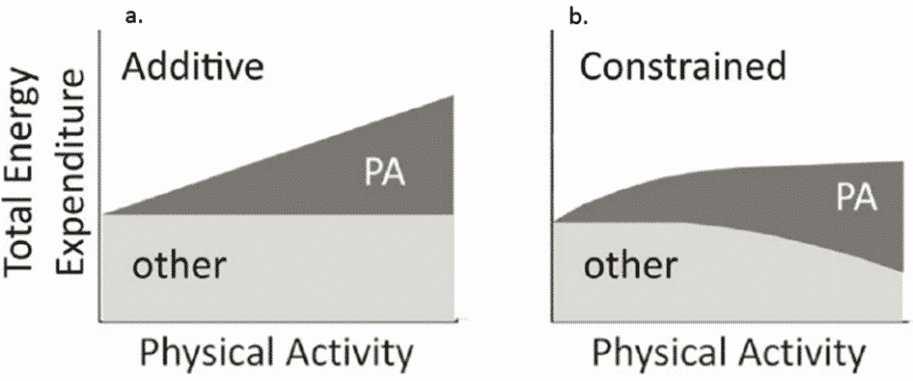
Long-Term Metabolic Adaptations to Physical Activity
The predominant view on the effect of exercise on total energy expenditure (TEE) was based mainly on exercise intervention studies, which showed a linear relationship between the amount of physical activity (PA) and TEE, known as the additive model (Fig. 1a). According to the additive model, increased PA will result in elevated TEE in a dose-response manner. These results were the basis for population health recommendations to incorporate exercise as a weight loss strategy, but the lack of clear evidence in clinical trials has caused some to question its effectiveness. Although exercise is commonly recommended as an important strategy for weight reduction and maintenance, intervention studies have demonstrated that exercise training without a dietary intervention results in far less weight loss than expected, based on the energy expended during exercise. Hence, recent free-living and population-based studies have challenged the traditional, additive model-based assumptions. It was found that in free-living conditions, the relation between PA and TEE is linear at low activity levels but plateaus at high activity levels. Based on this finding, a new constrained TEE model was suggested (Fig. 1b). According to the constrained model, the body adapts to increased PA by reducing energy spent on other activities (both behavioral and physiological adaptations), which results in a less-than-expected increase in TEE. The constrained model may explain the results from studies on the long-term effect of exercise on weight loss, showing no weight loss after ~1 year (15–20) even when associated with high doses of exercise, with relatively high inter-individual variability. Therefore, while exercise lowers all-cause mortality, and prevents the onset of type II diabetes and cardiovascular risk, the effectiveness of PA as a weight loss strategy, in the form of regimented PA, has been the subject of much debate.

Powered by Eventact EMS